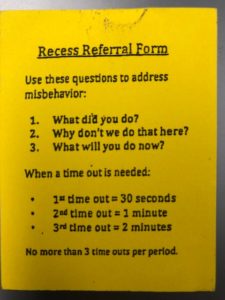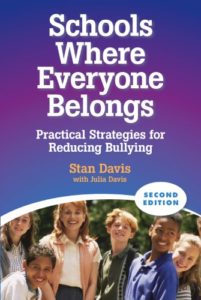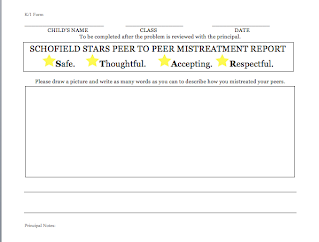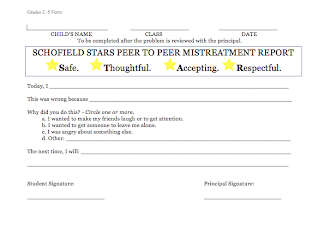School Culture Goal: We aim to help children practice behaviors that help others feel valued and connected. We have therefore adopted Schofield’s S.T.A.R. behavior model–Safe, Thoughtful, Accepting, Respectful. When students engage in these behaviors it contributes to a positive, inclusive culture that benefits all students.
Our school culture work has allowed our students to identify the behaviors that can cause the most harm and which ALL adults need to address:
- Name Calling (especially name calling based on race, ethnic background, gender, physical traits, or disability)
- Physical Contact (pushing, shoving, slapping, etc.)
- Threats (to hurt others, to leave someone out of a group, etc.)
- Swearing or making negative rude gestures
- Spreading rumors
- Exclusion (stopping someone from participating in an activity or from having friends)
Our Approach: Schofield faculty will consistently address these behaviors and do so from the vantage point that kids can learn from their mistakes. Repeated misbehavior is often a result of lagging social skills. Conversations are initiated as learning opportunities. Students will often hear adults ask, “What did you do to mistreat a classmate? Why donít we do that here? ~What will you do differently?” Moreover, students will be asked to process their mistreatment by writing and drawing about their mistreatment and how to change their behaviors moving forward. Students will also have the opportunity to offer repair for mistreatment. This may include, among other things, writing a letter of apology, including someone in a game, doing something nice or offering a compliment, inviting someone to have lunch and play a game. Such repair helps kids practice socially acceptable behaviors and keeps relationships healthy and strong. See reflection forms below.
Consequences: Consequences start small to allow us to focus on helping students develop those lagging skills. Our aim is not to punish but to help students become more reflective, which often helps develop and strengthen empathy. Students may miss 5 minutes of recess or an entire recess for repeated mistreatment of peers. We understand the importance of having kids get outside during recess. Since we have two recess periods, this consequence still allows students to get some fresh air and exercise. More serious behaviors or persistent repetition of negative behaviors will lead to more serious consequences. Students may also engage in some form of community service at the school and if necessary call home to share a reflection of learning. This home-school connection is critical in showing students that the school partners with families in supporting their social, emotional development.
Recess Approach: Each day we aim to help students be safe, inclusive, and kind. We have adopted language to support all of our recess staff in maintaining a consistent approach. The following yellow card, worn on lanyards, has helped all recess staff address issues that arise without any delay.

Schofield is very fortunate to have worked on these approaches with the help of Stan Davis, author of Schools Where Everyone Belongs.

Research Press Publishers Review: “For all grade levels, this second edition (also available in Spanish) is packed with practical guidelines and proven strategies for implementing a whole-school approach for reducing bullying. The author draws on theory and research, as well as over two decades of experience as a school counselor and consultant to provide educators with his creative ideas and successful techniques. Interventions to help aggressive youth internalize rules and develop conscience are paired with methods for helping targets of bullying. Chapters cover a wide range of topics, including myths about bullying, acknowledging positive behavior, effective discipline, working with parents, relational aggression, empowering bystanders, and preventing disability harassment.”
(If you feel your child is being bullied, please read the district plan and complete the bullying report form and submit it to the principal directly.)
Open Circle is a comprehensive social and emotional learning program that supports elementary school children in developing skills needed to be good learners and to form healthy, positive relationships with people throughout their lives. The class will meet in a circle for 15-20 minutes.
The lesson topics include being a good listener, including one another, cooperating, understanding feelings, teasing, recognizing differences among people, getting calm, problem solving, positive self talk, and more.
The goals are to create a cooperative classroom environment and to give children the skills they need to solve interpersonal problems and build positive relationships.
In addition, as a result of a WEF grant, the district has contracted Stan Davis, author of Schools Where Everyone Belongs, to work with schools to do an analysis of discipline procedures and to set goals for improving how schools handle bullying. We look forward to this partnership and will keep the community apprised along the way.


